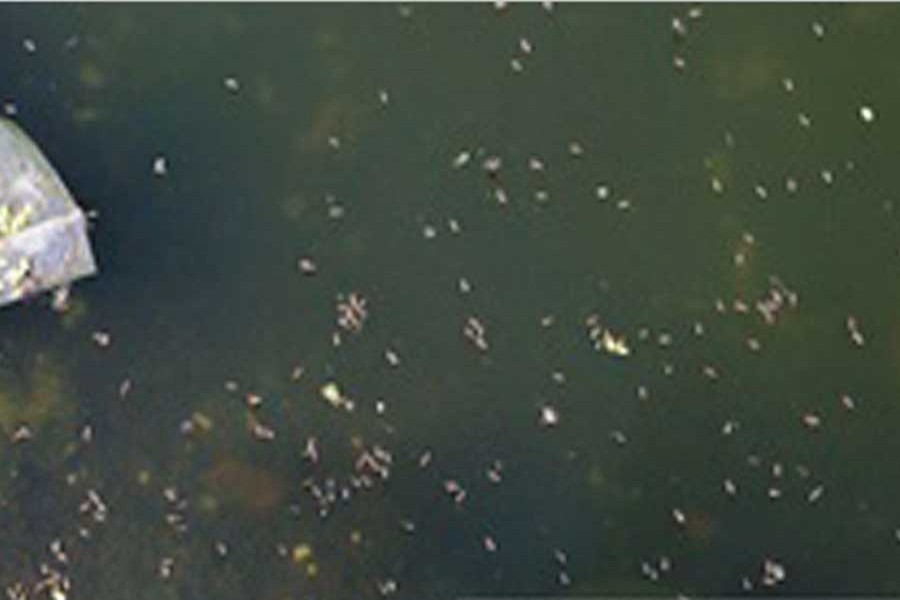Despite preventative measures, Dhaka has not received any respite from the prevalent mosquito problem that spread diseases like dengi and chikungunya last year.
Dhaka South City Corporation (DSCC) recently found Aedes larvae in 11 of 18 households during inspections in Dhanmondi, Kalabagan, and Pirerbagh neighbourhoods. The mosquito larvae was also found in some other neighbourhoods too.
DSCC Mayor Mohammed Sayeed Khokon called the presence of Aedes larvae before the monsoon as ‘alarming’. City corporation officials have blamed the lack of awareness of city residents for the presence of mosquitoes.
The DSCC has formed committees in five areas on April 8 to coordinate larvicide efforts and to destroy mosquito breeding grounds with the help of ward councillors.
The survey report of the Mosquito Eradication Programme Committee in DSCC Area-1 found that at least three among seven households surveyed in Dhanmondi had Aedes larvae while they were found among four among six households in Kalabagan. At least four among five households surveyed in Pirerbagh were found to have Aedes larvae.
Mosquitos mostly use water drums, flower pots, broken earthen pots, discarded pails, bottles, containers, tyres, polythene bags, potholes, drains, and ponds for their breeding grounds.
Larvae was also found inside the concrete mixture machine and water tank in two houses under construction.
The DSCC have also found Aedes larvae in other neighbourhoods under its jurisdiction, said officials.
At least four among 15 households surveyed in Bakshibazar, ward no. 27 in DSCC were found to have Aedes larvae, said SM Akhtaruzzaman, Executive Officer in DSCC Area-3.
“Areas under our jurisdiction have less prevalence of mosquitoes; however, we have already sprayed medicine in four of the households where we found the larvae,” he said.
Reports of ongoing inspections in DSCC Area-2 and DSCC Area-5 are yet to be submitted, said DSCC Health Officer Dr Nishat Parvin.
“Our spray-men are visiting households regularly and informing us if they find larvae. Also, they are spraying pesticides,” she said.
She added that Aedes larvae have been found in the neighbourhoods of Khilgaon, Madartek, Malibagh, Mouchak and Gulbagh, but not in Dhalpur during inspections.
No cases of chikungunya have been reported in Dhaka although a few patients were found suffering from dengi, said Meerzadi Sebrina Flora, director of the Institute of Epidemiology Disease Control and Research or IEDCR.
“There have been normal cases of Dengue but not an outbreak; also, we still haven’t received any case of Chikungunya,” she said.
She mentioned the survey conducted by Directorate General of Health Service or DGHS is enough to create awareness on the issue and suggested strengthening the mosquito eradication programme to control the spread of Dengue and Chikungunya. “If we do not eradicate the larvae now, it will breed into mosquitoes,” she said.
Institute of Epidemiology, Disease Control and Research in DGHS conducted a survey in 100 places of 93 wards—59 in DSCC and 41 in DNCC in January and have detected 19 neighbourhoods as most vulnerable in spreading dengi and chikungunya.
However, DSCC Chief Health Officer Brg Gen Dr Sheikh Salah Uddin blamed the lack of awareness among city residents for the mosquito prevalence in the city. His office has often been criticised for the problem.
“We are checking the households and if found, destroying mosquitoes spawn. But we cannot do this everywhere and so people should be made aware of it,” he said.
During an event in Nagar Bhaban on March 19, reports bdnews24, Mayor Sayeed Khokon had threatened to penalise people if any mosquito breeding ground was found in their home.
“I called for inspections of different neighbourhoods and found the report quite alarming; I never expected 80 per cent of the surveyed neighbourhood would have Aedes larvae,” the mayor said.
The mayor said DSCC’s mosquito eradication programme will be in full swing at the beginning of Ramadan.
“We will do everything possible to control the spread of dengi and chikungunya,” he said.
He also said households are marked when Aedes larvae is found.
“We will take disciplinary actions against them if Aedes larvae are found there again,” he said.


